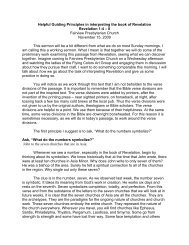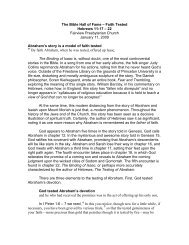To boldly go where no man has gone before Hebrews 4:14 – 16 ...
To boldly go where no man has gone before Hebrews 4:14 – 16 ...
To boldly go where no man has gone before Hebrews 4:14 – 16 ...
You also want an ePaper? Increase the reach of your titles
YUMPU automatically turns print PDFs into web optimized ePapers that Google loves.
You may recall that last year around this time there was a devastating<br />
earthquake in the country of Peru. Many rightly expressed concern. Many<br />
prayed. Many nations sent relief assistance. The news of the earthquake hit the<br />
Atkinson family in a <strong>man</strong>ner that was different for <strong>man</strong>y here in America, for we<br />
knew the area <strong>where</strong> the quake did its destruction. We have traveled there. We<br />
had lived in Peru. We have stayed in the little village of Paracas, that <strong>no</strong> longer<br />
exists. We knew people affected by the quake. The nature of our sympathy was<br />
deepened and increased because of our experience.<br />
The scriptures teach that God understands. He k<strong>no</strong>ws us. He <strong>has</strong> created<br />
us. Even more, in Jesus Christ, he <strong>has</strong> become one of us. Jesus Christ himself<br />
<strong>has</strong> endured trial and suffering. Jesus Christ was exposed to everything we<br />
experience in life. For this reason, he <strong>has</strong> capacity for sympathy.<br />
Every <strong>no</strong>w and again you may meet someone who is dismissive of Jesus’<br />
ability to be sympathetic because Jesus was also sinless. Such a claim usually is<br />
dismissive of Jesus’ ability to understand temptation, since he himself never gave<br />
in to it. This is completely erroneous. In fact, only one who is sinless k<strong>no</strong>ws the<br />
full extent of temptation. We who are sinful always give in to temptation well<br />
<strong>before</strong> it reaches is apex, its full extent. We do <strong>no</strong>t k<strong>no</strong>w the greatest temptation<br />
because we have succumbed <strong>before</strong> we encounter it. In contrast, Christ<br />
experienced temptation to its fullest, more fully than you or I could imagine, and<br />
still remained true to God.<br />
Jesus is qualified to be the great high priest. He is sympathetic in his office<br />
as high priest. And, as a result of these two together, Jesus Christ is an<br />
approachable high priest.<br />
Jesus Christ, our high priest, is approachable<br />
<strong>16</strong> Let us then with confidence draw near to the throne of grace,<br />
Some Christians pray to Mary or to saints in part because they see them<br />
as being more approachable, more sympathetic, or more understanding. This is<br />
the premise behind the idea of patron saints; that the saint is more approachable<br />
and sympathetic to those who are his patrons. However, this is a serious<br />
misunderstanding of Christ’s person and accomplishment.<br />
Across town, at the moment of Jesus’ death on the cross, something very<br />
significant occurred: the heavy curtain that hung between the Holy Place and the<br />
Holiest of Holies in the Temple was torn in two, from top to bottom. The barriers<br />
that separated <strong>man</strong> from God were decisively breached in Christ’s substitutionary<br />
sacrifice on the cross. The curtain is torn. The doors stand open. The walls are<br />
breached. The divisions are overcome. The angels of God are <strong>no</strong> longer<br />
guarding the Tree of Life with flaming sword. We do <strong>no</strong>t need St. Barbara, St.<br />
Jude or St. Anthony in order to approach God. Jesus Christ, the captain of our<br />
faith, <strong>has</strong> blazed the trail. He is the only one to whom we must look. He is the














